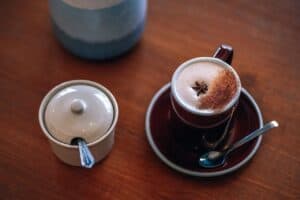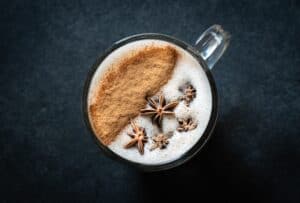Latte is one of the most popular coffee drinks, and it’s easy to see why. The combination of espresso, creamy steamed milk, and a thin foam layer makes a delicious and creamy treat perfect for any time of day. However, is a latte bitter?
Contents
Is Latte Bitter?
The truth is that lattes can be both bitter and sweet as a personal preference. Some people like their lattes on the bitter side, while others prefer a sweeter taste.
A few aspects can also impact the taste of a latte. These are things to do with the quality of the espresso shots and the type of coffee beans used. The amount of milk used and the strength of the espresso shots also play a key role in the tang of your coffee.
Speaking of strength, “Is a latte stronger than coffee?” While lattes contain espresso shots, they are commonly diluted with milk. This reduces their level of caffeine concentration compared to regular coffee.

Factors That Could Affect the Latte’s Bitterness
Sipping on a bitter cup of coffee is like discovering that your favorite TV show has been canceled – a total bummer! Caffeine naturally infuses some bitterness into the coffee, though it only accounts for 10-15% of the flavor.
A touch of bitterness can help to balance out the coffee’s acidity. However, if the bitterness is overwhelming or the coffee tastes too bitter, it’s a major disappointment! So, if your cup of joe is leaving a bad taste in your mouth, it could be due to one or more factors, like:
Quality of Coffee Beans
When you brew your latte using the best-tasting beans, they will impart an intricate flavor that helps even out any bitterness from the espresso. Likewise, using lower-quality beans might result in a one-dimensional and bitter taste.
Coffee Brewing Technique
Skilled baristas understand how to extract the perfect espresso shot to obtain the finest flavors out of the coffee beans. Over or under-extracting the shot can cause an undesired bitter or sour taste. Let’s leave the sour tastes for candies, shall I?
The Grind of the Beans
For you to craft a well-balanced latte, attaining the ideal grind is paramount. A finer grind can contribute to a more bitter and potent taste. A coarser grind can provide a softer and sweeter taste profile.
Roast Level
Another factor that can play a role in deciding the extent to which your latte will be bitter is the roast level. I will elaborate! Darker roasts tend to be more bitter and intense. Light and medium roasts are known to have a nuanced flavor.
The Water Quality
Here, I am referring to the mineral content present in water. Water high in minerals like calcium and magnesium can interact with your latte creating a bitter aftertaste.
On the other hand, “soft water,” with a lower mineral range, can create a smoother and sweeter taste in your coffee. It’s worth noting that not all added flavors will work well with a latte’s taste profile. Some tastes may clash with the coffee’s natural flavors, resulting in a less enjoyable taste.
Milk Choice and Preparation
When you’re brewing the ultimate latte, the type of milk you choose can make or break your brew!

- Non-dairy coconut milk has a naturally sweet and nutty flavor that easily complements the bitterness of espresso
- Soy milk’s creamy feel and slightly sweet taste enhance the flavor of a latte
- Almond milk, with its nutty flavor, adds a unique and delicious twist to a latte
- Condensed milk creates an extra sweet, creamy, and indulgent latte
- Oat milk is the hipster of the milk family. It’s great for adding sweetness to your latte
- Skim milk: Don’t let the word “skim” fool you – this milk is still delicious, supplementing the bitterness of the espresso
- 2% milk is a happy medium between skim and whole milk, which can add some sweetness to your latte
- Whole milk is the creamiest, richest, and sweetest milk that creates a smooth and velvety latte.
Comparing Lattes to Other Popular Coffee Drinks
Let’s see how lattes, both hot and cold, stack up against other popular choices when it comes to sweetness and bitterness. After all, cafes worldwide have more than just lattes on their menus!
Is Latte Sweeter Than Coffee?
It depends on the amount of sugar added to either drink! Generally, lattes are sweeter than black coffee because they contain steamed milk and a bit of foam to balance out the espresso’s bitterness. Espresso used in lattes also has slightly more water than coffee hence it is not as concentrated.
Is Latte Sweeter Than Cappuccino?
Both drinks become tastier as steaming brings out the natural taste of milk. Like lattes, cappuccinos have espresso and milk, though they have less milk and more foam, giving them a drier texture and a slightly stronger taste. Latte’s higher milk-to-espresso ratio means they will mostly taste sweeter than cappuccinos.
Is Latte Sweeter Than Mocha?
Mochas are lattes with chocolate syrup or powder added to them. This implies that they are much sweeter and richer than a regular latte.
Lattes have a more balanced taste profile emphasizing espresso and steamed milk rather than added flavors or taste-enhancing components.
Is Latte Sweeter Than Americano?
An Americano is simply hot water added to a shot of espresso, which makes it taste like a milder and less intense version of an espresso. Compared to a latte, an Americano has a more robust coffee flavor and less sweetness.
While the 1:2 ratio of espresso and water in lattes means that water does dilute espresso, its flavor remains intact, which explains why an Americano becomes stronger vis-à-vis a latte.

Is Latte Sweeter Than Chai?
Some people may wonder if lattes and chai are the same thing. They are quite different. A chai is usually sweeter than a latte because of the inclusion of assorted spices in the former. A latte is primarily made up of espresso and steamed milk.
Tips to Reduce the Bitterness of the Latte
If you find your coffee tasting bitter, don’t worry! I’ve got some fantastic tricks to sweeten up your brew and perk up your taste buds.
- Go for a light or medium roast for a sweeter taste
- Try using a coarser grind to achieve a smoother and less bitter taste
- Add more milk to your latte to dilute the espresso and reduce the bitterness
- You can also add flavor syrup like vanilla or caramel to balance out the latte
- Experiment with different brewing methods like the French press or pour-over to see if you get a less bitter taste
Related Questions
Do You Put Sugar in Latte?
Sugar is optional in a latte. It depends on the individual’s taste preference. Some people like their latte sweetened, while others prefer it without any sweeteners. Adding sugar can greatly increase the calorie count of the drink.
What Does a Latte Taste Like?
A latte has a taste that is not too strong or overbearing, like regular coffee. The balance of milk to espresso provides a mild, creamy flavor with a subtle coffee taste. The resulting flavor profile is smooth, with a creamy texture complemented by the espresso’s bitterness.
Is There a Way to Tell if My Latte Is Overly Bitter?
These are the telltale signs to watch for if you want to find out the bitterness of your latte. A strong, lingering harsh taste, an extreme or unpleasant aroma, a dark or burnt color, and a thin or watery texture that lacks creaminess.
Conclusion
Several elements can impact the taste of a latte. The quality of beans, brewing technique, and milk choice are some of them. A balance of bitterness can be good, though too much can ruin the taste. Lattes are generally sweeter than black coffee, though less sweet than chai.


